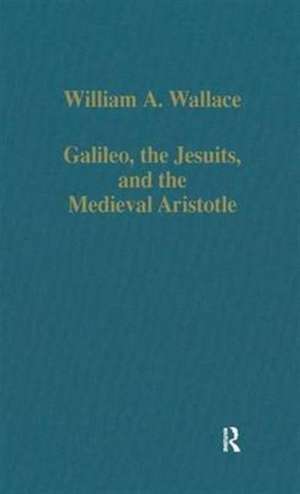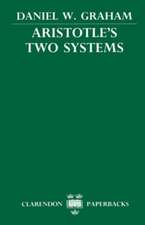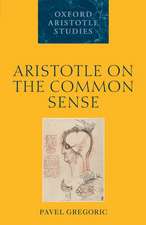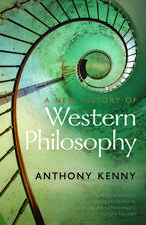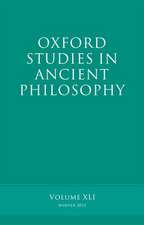Galileo, the Jesuits, and the Medieval Aristotle: Variorum Collected Studies
Autor William A. Wallaceen Limba Engleză Hardback – 27 oct 1991
Din seria Variorum Collected Studies
- 9%
 Preț: 938.85 lei
Preț: 938.85 lei -
 Preț: 311.41 lei
Preț: 311.41 lei -
 Preț: 351.48 lei
Preț: 351.48 lei -
 Preț: 313.38 lei
Preț: 313.38 lei -
 Preț: 386.77 lei
Preț: 386.77 lei -
 Preț: 325.68 lei
Preț: 325.68 lei -
 Preț: 396.00 lei
Preț: 396.00 lei -
 Preț: 312.75 lei
Preț: 312.75 lei - 9%
 Preț: 1041.23 lei
Preț: 1041.23 lei -
 Preț: 258.66 lei
Preț: 258.66 lei -
 Preț: 299.55 lei
Preț: 299.55 lei - 9%
 Preț: 938.08 lei
Preț: 938.08 lei -
 Preț: 343.33 lei
Preț: 343.33 lei -
 Preț: 311.18 lei
Preț: 311.18 lei - 9%
 Preț: 937.13 lei
Preț: 937.13 lei -
 Preț: 341.55 lei
Preț: 341.55 lei -
 Preț: 320.00 lei
Preț: 320.00 lei - 34%
 Preț: 764.20 lei
Preț: 764.20 lei - 22%
 Preț: 312.43 lei
Preț: 312.43 lei - 34%
 Preț: 739.65 lei
Preț: 739.65 lei - 34%
 Preț: 764.20 lei
Preț: 764.20 lei - 34%
 Preț: 680.73 lei
Preț: 680.73 lei - 26%
 Preț: 247.40 lei
Preț: 247.40 lei - 34%
 Preț: 485.78 lei
Preț: 485.78 lei - 34%
 Preț: 764.20 lei
Preț: 764.20 lei - 34%
 Preț: 767.07 lei
Preț: 767.07 lei - 34%
 Preț: 764.20 lei
Preț: 764.20 lei - 34%
 Preț: 769.51 lei
Preț: 769.51 lei - 34%
 Preț: 764.20 lei
Preț: 764.20 lei - 34%
 Preț: 826.68 lei
Preț: 826.68 lei - 25%
 Preț: 225.28 lei
Preț: 225.28 lei - 25%
 Preț: 225.54 lei
Preț: 225.54 lei - 34%
 Preț: 736.38 lei
Preț: 736.38 lei - 34%
 Preț: 738.43 lei
Preț: 738.43 lei - 25%
 Preț: 226.52 lei
Preț: 226.52 lei - 33%
 Preț: 491.66 lei
Preț: 491.66 lei - 34%
 Preț: 485.78 lei
Preț: 485.78 lei - 34%
 Preț: 485.78 lei
Preț: 485.78 lei - 36%
 Preț: 739.17 lei
Preț: 739.17 lei - 38%
 Preț: 766.34 lei
Preț: 766.34 lei - 31%
 Preț: 473.94 lei
Preț: 473.94 lei - 18%
 Preț: 807.71 lei
Preț: 807.71 lei - 38%
 Preț: 774.91 lei
Preț: 774.91 lei - 34%
 Preț: 764.20 lei
Preț: 764.20 lei - 34%
 Preț: 764.20 lei
Preț: 764.20 lei - 51%
 Preț: 485.78 lei
Preț: 485.78 lei - 34%
 Preț: 485.78 lei
Preț: 485.78 lei - 34%
 Preț: 769.10 lei
Preț: 769.10 lei - 34%
 Preț: 766.65 lei
Preț: 766.65 lei - 18%
 Preț: 1019.01 lei
Preț: 1019.01 lei
Preț: 770.74 lei
Preț vechi: 1158.42 lei
-33% Nou
Puncte Express: 1156
Preț estimativ în valută:
147.48€ • 154.37$ • 122.75£
147.48€ • 154.37$ • 122.75£
Carte tipărită la comandă
Livrare economică 31 martie-14 aprilie
Preluare comenzi: 021 569.72.76
Specificații
ISBN-13: 9780860782971
ISBN-10: 0860782972
Pagini: 352
Dimensiuni: 150 x 224 mm
Greutate: 0.82 kg
Ediția:1
Editura: Taylor & Francis
Colecția Routledge
Seria Variorum Collected Studies
Locul publicării:Oxford, United Kingdom
ISBN-10: 0860782972
Pagini: 352
Dimensiuni: 150 x 224 mm
Greutate: 0.82 kg
Ediția:1
Editura: Taylor & Francis
Colecția Routledge
Seria Variorum Collected Studies
Locul publicării:Oxford, United Kingdom
Cuprins
Contents: Aristotelian influences on Galileo's thought; The problem of causality in Galileo's science; Aristotle and Galileo: the uses of hypothesis (suppositio) scientific reasoning; Galileo and Aristotle in the Dialogo; Randall redivivus: Galileo and the Paduan Aristotelians; The early Jesuits and the heritage of Domingo de Soto; The problem of apodictic proof in early 17th-century mechanics: Galileo, Guevara, and the Jesuits; Science and philosophy at the Collegio Romano in the time of Benedetti; Albertus Magnus on suppositional necessity in the natural sciences; The scientific methodology of St Albert the Great; St Thomas's conception of natural philosophy and its method; Aquinas on the temporal relation between cause and effect; Thomas Aquinas on dialectics and rhetoric; Aristotelian science and rhetoric in transition: the Middle Ages and the Renaissance; The intelligibility of nature: a neo-Aristotelian view; Index.
Notă biografică
William A. Wallace is Emeritus Professor of Philosophy and History of Science, The Catholic University of America, Washington DC, USA
Descriere
The conventional opposition of scholastic Aristotelianism and humanistic science has been increasingly questioned in recent years, and in these articles William Wallace aims to demonstrate that a progressive Aristotelianism in fact provided the foundation for Galileo's scientific discoveries.
